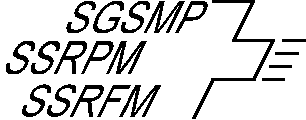
| Bulletin 2/01 ---------- Juliana Denekamp ---------- andere Bulletins / d'autres bulletins / altri bolletini / other bulletins |
Professor Juliana Denekamp (1943-2001)
Julie was the author of over 300 publications between 1966 and 2001. Her extraordinary energy and scientific curiosity formed the basis of her numerous and major contributions in cell kinetics, hypoxia, fractionation, the effect of neutrons, late normal tissue reactions, radiation protectors and sensitizers, the tumour vasculature and angiogenesis, to name but a few. Not only was she a pioneer in several fields of fundamental radiobiology, but she was also one of those rare researchers who understand well the problems encountered in the clinic to make a constant bridge between clinicians and basic scientists. "From the bench to the bedside and back to the bench again" was one of her favourite motto’s and illustrates how she was one of the few and valuable proponents of translational research. In any meeting she attended her presence was immediately felt. In a large audience, even if she arrived late and had not even spoken, one "knew" she was there, without looking back. She used to argue about almost anything, to be provocative in basic or clinical fields thus stimulating those present to generate new ideas. She invented new radiotherapy strategies, including unconventional fractionation schemes and the famous ARCON. Julie has received many medals and awards, including the prestigious Roentgen Award of the British Institute of Radiology and the Radiation Research Award of the Radiation Research Society. For her scientific contributions she was also made an Honorary Texas Citizen. Over the years both on a consultatory basis and as a collaborator, Julie has promoted and furthered the field of Radiation Research in Switzerland. In recognition of her significant contributions, SASRO granted Professor Denekamp a honorary membership of the society. Julie had many talents, including gardening, cooking and a particular interest in alpine flora which she enjoyed while visiting Switzerland. Sadly she was struck by the disease that had been the focal point of her research work. She fought it with the vigour that was a characteristic of her personality and for which we all had great respect. She made no secret of her illness and discussed it openly with her colleagues. Julie lost her personal fight against cancer on Wednesday, June 6th 2001, whilst visiting her family in Wales. On that day the world lost a truly outstanding scientist. The moving funeral took place in Cwmbran, Wales and was attended by her loving family and close friends and colleagues from the UK, Europe and USA. She will be sadly missed by family, friends and colleagues the world over. To Bo, who was a very supportive husband, and to Julie's family we extend our deep felt sympathy. Nigel Crompton, Bernard Davis, René-Olivier Mirimanoff, Wolf Seelentag |
|
| top of page | Diese Seite wird von
Wolf Seelentag betreut (Bulletin-Redaktoren: Roman Menz
und Werner Roser), letzte Bearbeitung 17 Juli 2010. Senden Sie Kommentare und/oder Ergänzungen bitte an den Webmaster SGSMP. |